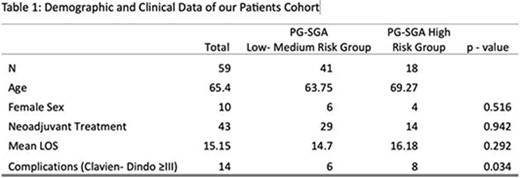-
PDF
- Split View
-
Views
-
Cite
Cite
Adam Mylonakis, Alexandros Kozadinos, Maximos Frountzas, Ilianna Tsikrikou, Maria Kyriakidou, Eva Karanikki, Irene Lidoriki, Konstantinos G Toutouzas, Dimitrios Theodorou, Dimitrios Schizas, 368. THE ROLE OF PG-SGA SCORE IN PREDICTING SHORT- TERM POSTOPERATIVE COMPLICATIONS IN ESOPHAGEAL CANCER SURGERY, Diseases of the Esophagus, Volume 37, Issue Supplement_1, September 2024, doae057.127, https://doi.org/10.1093/dote/doae057.127
Close - Share Icon Share
Abstract
The preoperative nutritional status is increasingly recognized as a determinant of postoperative outcomes in esophageal cancer patients. This study examines the relationship between preoperative nutritional scores, particularly the Patient-Generated Subjective Global Assessment (PG-SGA), and the incidence of short-term postoperative complications.
A prospective cohort study was conducted on patients undergoing surgery for esophageal cancer across two Surgical Departments at University Hospitals in Athens, Greece. Preoperative nutritional status was assessed using the PG-SGA score. Patients were categorized based on the PG-SGA score into low to medium risk with score of 8 or less, and high risk with score of 9 or higher. Postoperative complications were classified according to the Clavien-Dindo system, and their association with nutritional status was statistically assessed.
This study included 59 consecutive patients who underwent surgery for esophageal cancer with female-to-male ratio of 1:4.9 and a median age of 65.4 ± 10.4 years, 43 (72.9%) of whom had received neoadjuvant chemotherapy. Notable postoperative complications (Clavien- Dindo classification ≥III) occurred in 14 cases, including evisceration (n=1), hemorrhage (n=1), chyle leakage (n=1), anastomotic leak (n=8), pleural effusion requiring radiological intervention (n=2), and a persistent pneumothorax necessitating additional thoracic tube insertion (n=1). A statistically significant association was found between malnutrition, as indicated by the PG-SGA≥9, and the development of severe postoperative complications (Clavien- Dindo classification ≥III) (p = 0.034).
This study suggests that preoperative PG-SGA score is potentially significant predictors of short- term postoperative complications in esophageal cancer surgeries. Incorporating nutritional assessments into the preoperative evaluation may help identify high-risk patients and tailor perioperative care to improve surgical outcomes.




